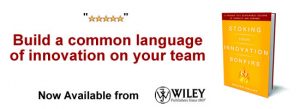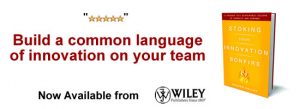Is Being Wrong the Only Way to Learn?
 Jason Potts said that to me last week when we were talking about the work he’s doing on his house. The house was severely damaged in the flood in January. For the past few weeks, Jason has been working on rebuilding it. He was telling me about how he’s learned to do a lot of the work – simply through experimenting.
Jason Potts said that to me last week when we were talking about the work he’s doing on his house. The house was severely damaged in the flood in January. For the past few weeks, Jason has been working on rebuilding it. He was telling me about how he’s learned to do a lot of the work – simply through experimenting.
Being wrong is actually an essential part of learning – as Jason’s experience with doors shows. Three months ago he didn’t know anything about installing handles on doors, and now he’s good at it. And the cost was much lower than he expected.
This is common error – we nearly always overestimate the cost of experimenting.
Part of this is because we don’t realize how cheap it is test most ideas. But the bigger problem is psychological – one big problem with experimenting is that we might be wrong. In her book Being Wrong, Kathryn Shulz explains why this is such a problem for many people:
“In our collective imagination, error is associated not just with shame and stupidity, but also with ignorance, indolence, psychopathology, and moral degeneracy. This set of associations was nicely summed up by the Italian cognitive scientist Massimo Piattelli-Palmarini, who noted that we err because of (among other things) “inattention, distraction, lack of interest, poor preparation, genuine stupidity, timidity, braggadocio, emotional imbalance,… ideological, racial, social or chauvinistic prejudices, as well as aggressive or prevaricatory instincts.†In this rather despairing view – and it is a common one – our errors are evidence of our gravest social, intellectual, and moral failings.
Of all the things we are wrong about, this idea of error might well top the list. It is our meta-mistake: we are wrong about what it means to be wrong. Far from being a sing of intellectual inferiority, the capacity to err is crucial to human cognition. … Thanks to error, we can revise our understanding of ourselves and amend our ideas about the world.”
In other words, being wrong is the only way to learn.
That’s one of the things I’ve been spectacularly wrong about recently. We’ve had a persistent leak in our basement, which became a torrent during the rains that led to the flood. Ever since I first noticed the leak, I thought that it was from a broken drain pipe. My presumption was that the pipe was underneath the bricks, and that we would have to get plumbers in and dig up the whole front of the house to fix the leak.
During the rain, I took a close look at the leak, and realized that my idea about its source had to be completely wrong. So I developed a new idea: that the water was leaking through the gap between the sidewalk and the bricks.
To test this idea, I tried the experiment you can see in the picture. I bought $20 of sealant, and did the world’s messiest caulking job along the two gaps that I thought might be the source of the leak.
Since then, not one drop of water has gone into the basement. My experiment worked. Now that I know what the problem is, I can work on coming up with a solution more elegant that my two messy lines of sealant.
There are some general lessons in all of this home improvement work:
- If things aren’t working right, examine your basic assumptions: I thought my leak would require a lot of time, money and expertise to fix. Jason thought the same about putting in doors. We were both wrong – but we only knew this once we actually tested those ideas.
- Experiments are a lot cheaper than you think: Who knew that doors only cost $30? People that had already tried to experiment with them, I suppose. My new idea about the leak could have been wrong, but the $20 of sealant was a lot cheaper than calling in a plumber to test out my first hypothesis. Find a way to test out your ideas as quickly and cheaply as possible.
- Being wrong is the only way to learn: Schulz’ point is exactly correct – being wrong is not a moral failing, or a sign of intellectual inferiority. It is the only way we can figure out how to do new things.
Experimenting isn’t just for fixing stuff around the house either – experimenting is a critical step in innovating. Earlier this week Jose Baldaia pointed to an excellent post by Amir Khella called How I launched a profitable product in 3 hours. Khella recounts how he developed a new product called Keynotopia which is, beautifully, a rapid prototyping (experimenting!) tool.
Here is part of what happened:
“It had been less than a month since I wrote about how I’ve been using Apple Keynote to prototype iPad applications. I debated whether or not I should publish the post, thinking there was nothing new or useful about it. Yet, I decided to do it for the fun of it. What I didn’t expect, though, was for the post to be picked up by some of the most respected bloggers, becoming popular among the design and iPhone communities. In less than three weeks, the post generated more than 10,000 visits and 500 downloads of the iPad keynote templates I posted along.”
Khella had an idea, but wasn’t sure if it would work, or even if it was any good or not. Instead of sinking a lot of further thought into it, he ran an experiment. He put together a website just to see if the idea would fly.
And it did. It’s great when your experiments work out this way. But what if it didn’t?
If no one had gone to the page, or if Keynotopia wasn’t useful for people, or if it didn’t work right, or if something else had gone wrong, he would have learned something – and for a pretty small investment, just three hours. If no one tried it out, then he’d know that the idea didn’t create value for people. Then he could move on to his next idea/experiment. If they had complaints about how it worked, then he’d know that the idea creates value, but his execution needs to be better. Then he could fix the problems and make the idea better.
In both of those cases, he would have been wrong about something. And much better off for knowing it.
Being wrong is the only way to learn. If you have a great idea, find a way to test it out. Experimenting is usually a lot cheaper than you think. Just remember Jason and the doors.

Don’t miss an article (2,350+) – Subscribe to our RSS feed and join our Innovation Excellence group!
 Tim Kastelle is a Lecturer in Innovation Management in the University of Queensland Business School. He blogs about innovation at the Innovation Leadership Network.
Tim Kastelle is a Lecturer in Innovation Management in the University of Queensland Business School. He blogs about innovation at the Innovation Leadership Network.
NEVER MISS ANOTHER NEWSLETTER!
LATEST BLOGS
The Evil Downside of Gift Cards
This past holiday season I saw probably one too many articles trumpeting the value of gift cards to retailers and how they are a great thing for retailers. My skeptic side starts coming out as I see article after article appear, and I have to start asking “Is the increasing prevalence of gift cards as a holiday gift (primarily Christmas) a good thing for retailers?”
Read MoreWhy the iPhone will not succeed – Yet
The new Apple iPhone is set to launch on June 29, 2007 and the press and investors are making it a darling. Investors have run Apple’s stock price up from about $85 per share before its announcement to $125 per share recently, but the iPhone still will not succeed – at least not yet.
Read More



I don’t agree that being wrong is the only way to learn. Being open to new ideas and new knowledge is what is needed. Seeking out new knowledge is better. You can be wrong and not learn (lots of people seem to do this). You can be successful and see an even better way to do things and learn from it. Now I suppose you could try to make a claim that if you are not perfect you are “wrong” because you didn’t do (or understand) as well as possible. I think this is not a useful way to think about it. It is best to be open and seek out new knowledge and learn that way a great deal. Now you should also not be scared to be wrong. Be open to learn from what could be better and improve. The desire to always do better (understand more) is what is valuable in learning not being wrong.
The scientific method does not prove things, it simply eliminates what is not true. I see a parallel from learning when you are wrong, as you know what isn’t the right thing to do, or the right outcome. We recently wrote a review https://academy.justjobs.com/practice-situational-awareness where we discuss why it’s important to practice situational awareness, a concept that leads to better results.